When COVID-19 entered our cities and towns, the world seemed to change overnight for our children. Free-spirited and lively little people who love to run around and crave open spaces are now confined to staying at home, and this change brings many challenges, the biggest one being that many do not know how to express their anxieties about this situation.
Children are very astute at sensing emotions and vibes from their parents. They tend to understand immediately if we are upset, worried or tense, even if we mask our emotions. Therefore, parents may ask if it is important to talk about COVID-19 to their children? Absolutely! Most likely they have already seen the news about the pandemic or heard us discussing it. They may hear certain phrases such as “social distancing” and “stay at home” and “wash your hands” which bring up questions. Our response should be truthful, simple and age-appropriate. Too much information can be alarming and cause anxiety. Here is how we can talk to them in a balanced, supportive and open way.
-
Find out what your child already knows about COVID-19.
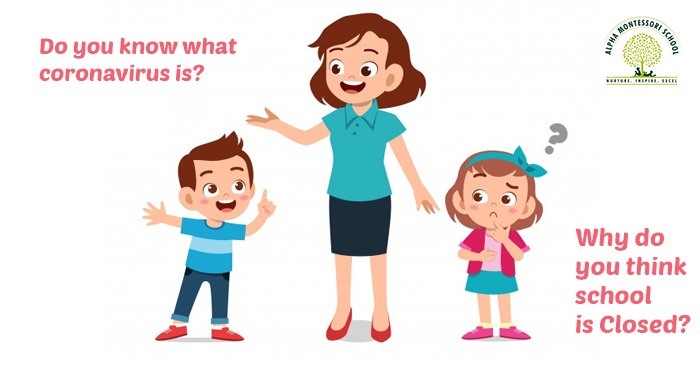
Children will know a good deal about the coronavirus and it is good to find out what they already know. “Do you know what coronavirus is?” If school is closed, ask your child, “Why do you think school is closed?” Their answers will depend on how much they know and their own emotions at that point in time. Some children may not be interested in asking questions or knowing more and that is perfectly fine too.
Some children may have overheard discussions on the testing, safety, and the number of cases about the coronavirus. While it is important to communicate with your family, make sure you know what your child already knows because they can sometimes misinterpret information.
According to Dr. Poltorak quoted in the New York Times, you can tell very small children, “There are lots of different viruses, like when your tummy hurts, or sometimes when you have a bad cold. Coronavirus is another type of virus.” According to Dr. Heard-Garris, you can also say, “Scientists and really smart people all around the world are trying to figure out how to keep people safe and healthy.”
-
Calm down and sort out your own feelings.
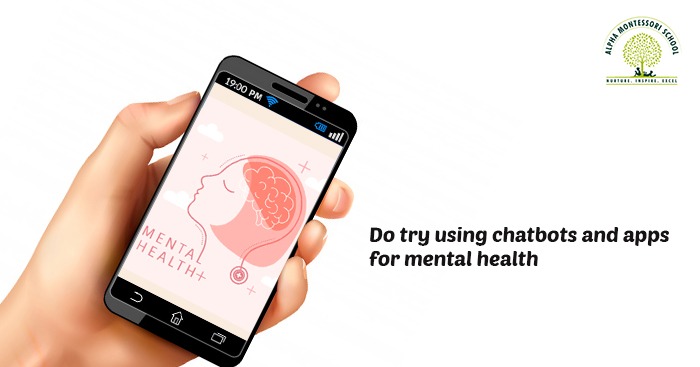
It‘s not easy, but we will all get through this time if we have emotional and mental strength. If we are upset, stressed out, angry and emotional, we will pass these responses on to our children. Manage your own anxiety. If your child asks you about COVID-19 and you are anxious, make sure you calm down before having a conversation with them. Try using chatbots and apps for mental health: Moodfit, MoodMission, Talkspace, Wysa, and Sanvello are apps and chatbots that can help you through these difficult times. Many of these are free with premium upgrades and most of the vital features are free. From guided meditation and breathing exercises to building emotional and physical energy reserves, parents need all the help they can get.
-
Reassure children. Teach them about safety.
Having a sense of control gives children courage to act in response to their anxiety or boredom. Teach them what they should do to stay healthy and safe from illness. Explain how viruses pass from person to person and how children can play a role in stopping the spread of this virus that is making many people sick. Show them how to properly wash their hands, cover a cough or sneeze, and leave space between one another. These are important habits which children should be taught from early life.
-
Give a positive context to the school closure.
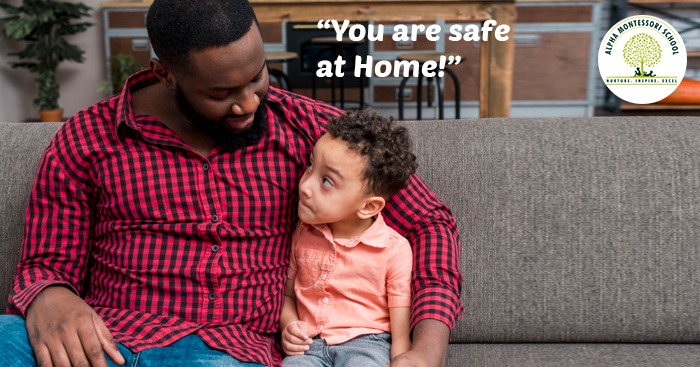
It is hard when children miss school and don’t see their friends or teachers. Frame this discussion in a positive context. Emphasize how good it will be to go back to school and see everyone. You might ask them what they miss most about school or what needs think to be done to get the school ready for kids again. A lively discussion about the need for good hygiene and friends can follow.
-
Talk about things other than the coronavirus.
Stick to the questions your child has and don’t volunteer too much information. Answer their questions, but talk about other things too. It’s a good time to learn what your children have been studying (via the internet), what friends they have contacted, what they have written in their daily diary, or maybe talk about the vacation they can plan for and about the great vacations from previous years. Get out the photos of your trips or put them up on your computer to start some good conversations.
Setting the tone also matters. Make sure you talk to your children calmly and in a reassuring, age-appropriate manner.
-
Give them space to express their fears too.
These are unexpected times for everyone including our children. Pay attention to your child’s emotions. Tell them that it is okay to be upset or angry. Then talk about ways to express that anger so that it gets outside of them rather than staying inside. Try to put yourself in their place and offer understanding and support. It’s also okay to say nothing at all but just to hug them and offer your presence if they are feeling worried or upset. My friend’s child was very sad that they could not go on the vacation they had planned for, or could not go to a friend’s birthday party. For us, this may seem trivial when the entire world is in the grips of a pandemic, but we must understand that these are children who live in the moment and their wants are important too.
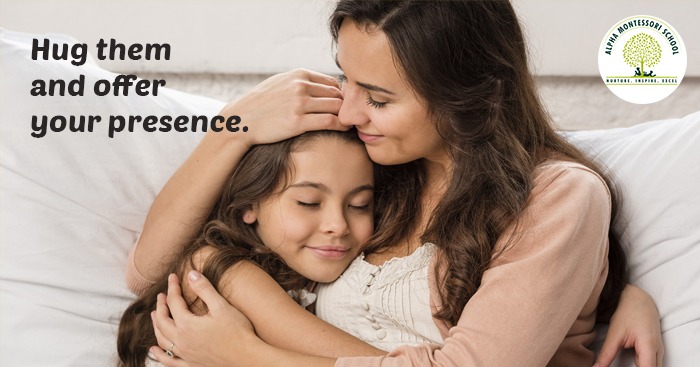
It is important to keep children positive and give them a feeling of safety. Tell your son that his friend’s birthday party had to be cancelled because everyone is staying home, and once it is safer to be in groups, they can have a playdate! Tell your daughter that it is disappointing that they cannot go on the vacation, but when the time is right, we will enjoy that vacation even more! Let your children know they can always talk to you about their disappointments or express their emotions. That’s what a family does.
-
Set a routine and do fun things.
School is closed, but you can set a routine and follow it. Children need routines to give them structure and purpose. It might include mealtimes, family time for board games, times for reading, movies, exercise, and times for learning. Check out our blog article on Montessori home activities to do with your child during the “COVID-19 Stay at Home” best practice.
Include exercise and physical activities in your daily routine. These might include indoor activities such as walking the stairs, pillow walk, animal walk, sit-ups, push-ups, running in place and don’t forget to dance to their favorite music! Outside games might be foot races, obstacle course, volley ball or any other ball game, frog hopping, jumping jacks, and of course kids always like to play “chase.” Find objects to practice balance, and other coordination activities. Try out many fun and short exercises kids can do at home. Here is a list!
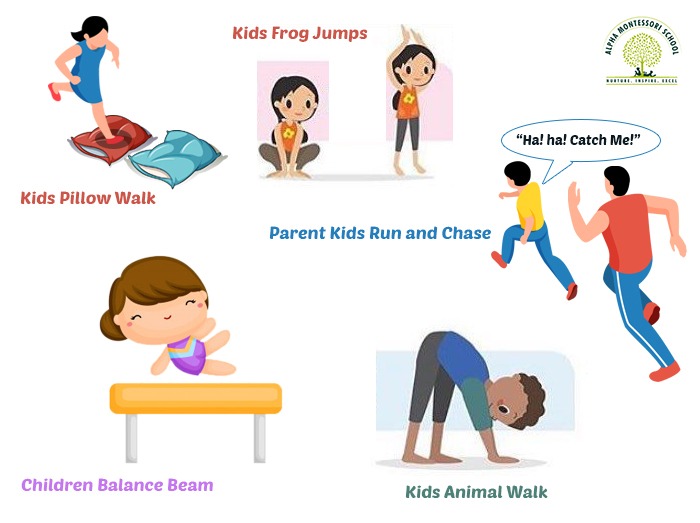
Search for free read-aloud book sessions, available from many publishing houses, authors, and celebrities. Music, drama, and even the art museums have virtual concerts and tours for free. Free audiobooks for children are available from Audible (as long as schools are out). Utilize this time to do some exciting things which are both social, entertaining and educational. Make time to be with your children, even if it is your work-at-home break or lunch. You may be the only person they can touch and hear and see right now.
Let your child make a phone call or do a video call when they are feeling lonely for friends.
Remember, you know your children better than anyone. Connect with them about their questions and worries and address them with love and care. Include your children in conversations you have with your family about the coronavirus but make sure you discuss sensitive or difficult topics in private. Always have an open line of communication with your kids and remember, this too shall pass!

 April 10th, 2020
April 10th, 2020

Your blog on reading is so full of great insights. Thank you for sharing.I have found it extremely helpful.
Can you be more specific about the content of your article? After reading it, I still have some doubts. Hope you can help me.
Your article helped me a lot, is there any more related content? Thanks! https://www.binance.com/register?ref=P9L9FQKY
I don’t think the title of your article matches the content lol. Just kidding, mainly because I had some doubts after reading the article.
Your point of view caught my eye and was very interesting. Thanks. I have a question for you.
What major change occurred along the Massa Lubrense coast in the early 20th century? Visit us IT Telkom
Can you be more specific about the content of your article? After reading it, I still have some doubts. Hope you can help me.
I don’t think the title of your article matches the content lol. Just kidding, mainly because I had some doubts after reading the article.
The lung path can be used for the systemic delivery of peptidetherapeutics.
fxwAiPEzAZA
9N5ybLijU3d
Thank you for your sharing. I am worried that I lack creative ideas. It is your article that makes me full of hope. Thank you. But, I have a question, can you help me?